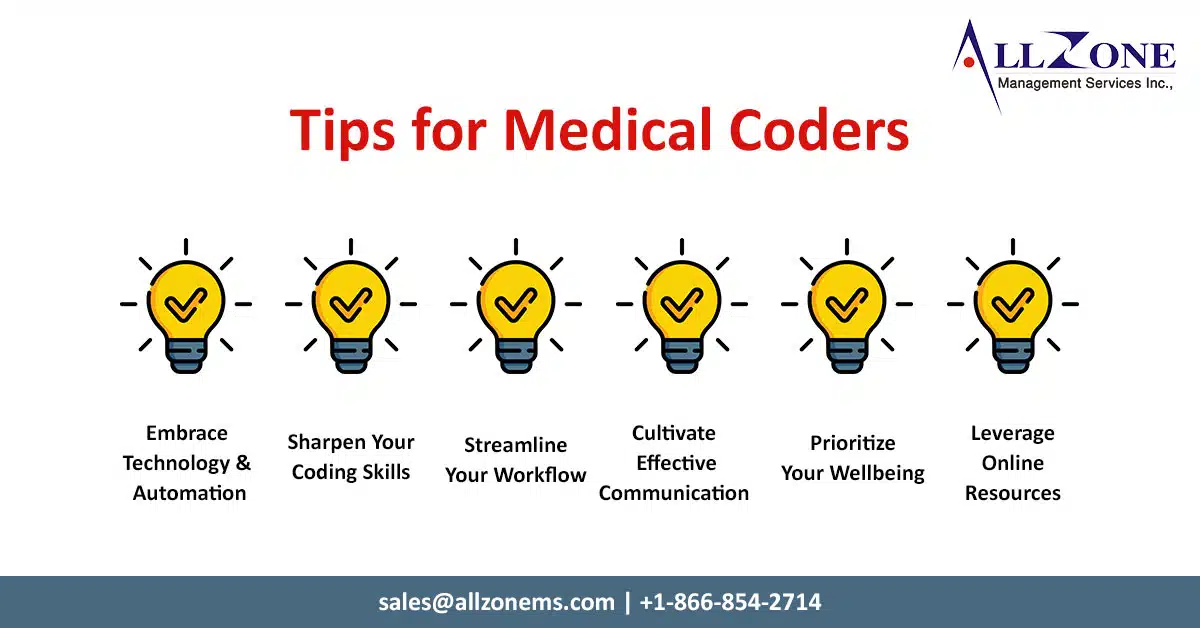In the fast-paced world of medical coding, efficiency is key. With ever-changing regulations, increasing workloads, and tight deadlines, maximizing your coding speed and accuracy becomes crucial. This newsletter explores a range of practical Medical Coders tips and strategies to help you conquer your coding tasks and free up valuable time.
Master the Art of Organization:
- Embrace a coding system: Develop a clear and consistent system for organizing your coding resources. Utilize color-coding for different coding manuals, create easily accessible folders for frequently used resources, and leverage digital bookmarks or note-taking tools for quick reference.
- Prioritize your tasks: Start your day by creating a prioritized list of coding tasks. Focus on the most complex or time-consuming tasks first when your energy is at its peak. Utilize time management tools like the Eisenhower Matrix to categorize tasks based on urgency and importance.
- Maintain a clean workspace: A clutter-free workspace promotes focus and reduces time wasted searching for resources. Organize your physical workspace and digital desktop to ensure everything you need is readily available.
Embrace Technology and Automation:
- Coding software: Invest in and explore the functionalities of reputable coding software. These programs can significantly reduce coding time by offering features like auto-population, code suggestions, and built-in compliance checks.
- Natural Language Processing (NLP) tools: Explore NLP tools that can analyze physician notes and automatically suggest appropriate codes. While not a replacement for human expertise, NLP tools can save significant time by pre-populating coding fields.
- Dictation software: Utilize dictation software to convert physician notes into text, eliminating the need for manual transcription. This frees up valuable time for coding tasks.
Medical Coders Tips: Sharpen Your Coding Skills:-
- Stay updated on coding changes: Regulatory changes are frequent in the medical coding field. Subscribe to reputable coding newsletters or association updates to stay informed about revisions to coding manuals and guidelines.
- Focus on coding accuracy: While speed is important, accuracy is paramount. Invest in continuing education courses or online resources that focus on specific coding areas where you might need improvement.
- Practice, practice, practice: The more you code, the faster and more efficient you become. Regularly practice coding scenarios, participate in online coding challenges, or volunteer for coding projects to refine your skills.
Medical Coders Tips: Streamline Your Workflow:-
- Develop a coding checklist: Create a checklist that outlines the steps involved in your coding process. This will help ensure you don’t miss any crucial steps and keeps your workflow consistent.
- Batch similar charts: Group charts by specialty or procedure type to streamline the coding process. This reduces context switching and allows you to leverage your knowledge of the specific codes required within a particular area.
- Utilize templates: Develop templates for frequently occurring procedures or diagnoses. These templates can act as a starting point, saving you time by pre-populating common codes and reducing the need for repetitive data entry.
Cultivate Effective Communication:
- Clarify with physicians: Don’t hesitate to reach out to physicians for clarification on unclear documentation. Timely communication with physicians can prevent coding errors and delays in the reimbursement process.
- Document your queries: Maintain a log of any clarifications you seek from physicians. This record can be valuable for future reference and ensures consistency in coding practices.
- Communicate clearly with coders and billers: If you are working within a coding team, maintain clear communication with other coders and billers. Discuss complex cases, share resources, and collaborate to identify and resolve coding discrepancies efficiently.
Prioritize Your Wellbeing:
- Take breaks: Schedule regular breaks throughout your workday to prevent burnout. Step away from your screen, stretch, or walk around to refresh your mind and improve concentration for the next coding task.
- Maintain a healthy lifestyle: Getting enough sleep, eating nutritious meals, and exercising regularly contribute to improved focus and overall well-being. A healthy body fuels a sharper mind, leading to increased efficiency.
- Learn to delegate: If possible, delegate tasks that are not directly related to coding. This allows you to focus on your core competencies and improve your overall productivity.
Leverage Online Resources:
- Coding communities: Join online communities for medical coders. These forums provide opportunities to connect with peers, share knowledge, and learn from others’ experiences.
- Coding tutorials and webinars: Explore online resources like coding tutorials and webinars offered by coding associations or software companies. These resources offer valuable training and insights to enhance your coding skills.

